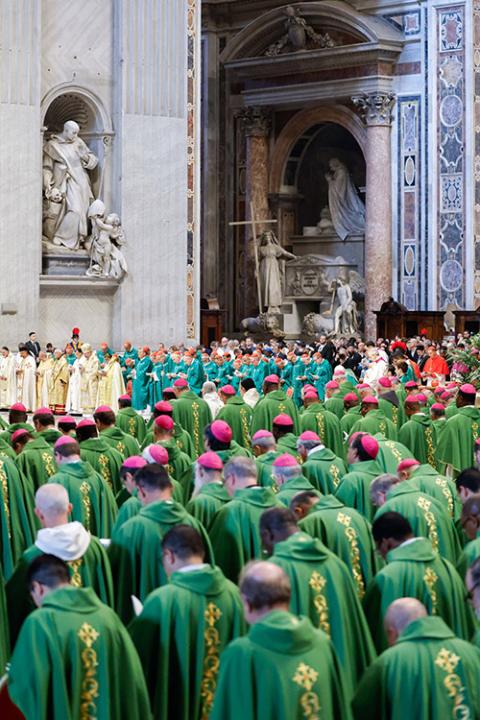My response: I appreciate this article by Daniel Horan in the National Catholic Reporter. I agree with Pope Francis that the ordained must reject clericalism and live according to Jesus' example of hospitality and accompaniment. Pope Francis could take a step forward for next year's Synod by adding more women -including Roman Catholic Women Priests- and LGBTQ as official delegates to create a better balance between laity and bishops and to "walk the talk" of listening to the most marginalized and excluded Catholics in our Church. Our voices were missing at the Synod this year.
I agree with Pope Francis that clericalism is a major problem in the institutional Church. This is why our mission in the Roman Catholic Women Priests Movement is to create a renewed priestly ministry in a community of equals to serve the people of God especially those who are excluded from Eucharist and other sacraments.
In our the Association of Roman Catholic Women Priests' governance model the entire community make decisions in a circular process of prayerful reflection, discernment, discussion and affirmation. This is also the model we use in our inclusive, egalitarian communities around the world.
Bridget Mary Meehan ARCWP
Pope Francis prays with participants in the assembly of the Synod of Bishops before making a rare speech to the gathering Oct. 25 in the Paul VI Audience Hall at the Vatican. (CNS/Vatican |
Article in NCR:
Pope Francis reminds us — again — to reject clericalism
Before the close of this year's synod session, Pope Francis restated what the church is at its core and, in doing so, denounced a church governed by clericalism.
November 2, 2023
Share on TwitterEmail to a friendPrint
"While coverage of the conclusion of the first in-person part of the church's synod on synodality is understandably garnering a lot of attention, especially as journalists and commentators begin to unpack the final synthesis document, I don't want to lose sight of a notable intervention (the term for a "short speech" at the synod) that Pope Francis delivered on Wednesday of last week (Oct. 25), days before the close of this year's session.
In his remarks, which were delivered in Spanish, the pope began by describing the church as "the faithful people of God, holy and sinful, a people convoked and called with the power of the beatitudes and of Matthew 25." This clear and simple, yet beautiful, statement follows from the Second Vatican Council's Dogmatic Constitution on the Church, Lumen Gentium, which reminds all the faithful that the church is first and foremost the "people of God." The reference to this theme from Vatican II recurred throughout the synodal discussions, especially in the final week.
One of the reasons Pope Francis' opening ecclesiological statement is significant is that, by restating what the church is at its core, it sets the stage for him to denounce what we might call false descriptions or images of the church.
The primary target of Francis' denouncement is a church governed by clericalism. This should be no surprise to anybody who has followed the pope's ministry as bishop of Rome over the years. In fact, ten years ago to the month, I wrote a column that ran with the title, "Lead us not into clericalism." In that essay, I lifted up Pope Francis' criticism of merciless and self-centered clergy, noting that his focus on the need that "the ministers of the church must be ministers of mercy above all," as he put it, was deeply in keeping with the vision of ministry articulated in the 13th century by his namesake St. Francis of Assisi.
Subsequently, the pope has named and called for the rejection of clericalism throughout his pontificate. One only has to read the numerous addresses to priests and bishops collected in the 2017 volume, With the Smell of the Sheep, to see how frequently the theme surfaces for Pope Francis.
I was delighted to see both the directness of his intervention and its consistency with his previous remarks. After emphasizing what Francis sees as the maternal dimensions and character of the church, which followed the reaffirmation of the universal dignity of all the baptized, the pope launches into his admonition: "When the ministers exceed their service and mistreat the people of God, they disfigure the face of the church with machismo and dictatorial attitudes."
What the pope is pointing to here is the all-too-common obsession some ordained ministers have with power and control, as well as the conflation of their personal identities with their ministerial offices. It's not unusual for some priests to refer to something they call "my priesthood," as if the reception of holy orders or the exercise of sacramental ministry was something magical, individually possessed and independent of the rest of the baptized.
Media)
As the renowned theologian and a Sister of Charity of Leavenworth Susan K. Wood notes, there is a real change in the ordained priest, but it is primarily a change in relationships: to Christ, to the bishop, to other ordained presbyters and to the rest of the baptized. This sense of the centrality of relationship at the heart of the identity and theology of ministerial priesthood is also something theologian Richard Gaillardetz has highlighted, such as in his 2003 essay, "The Ecclesiological Foundations of Ministry Within an Ordered Communion."
The ignoring or forgetting of the inherently relational character of ordained ministry in the church, and the failure to recognize that the ordained are part of the baptized and not apart from it, leads to a deeply distorted sense of church and ministry.
Pope Francis, in his intervention last week, compared the result of this relational amnesia to something like a secular business or even supermarket. "Either the church is the faithful people of God on the way, holy and sinful, or it ends up being a business offering a variety of services." The desire to control these "services" — rather than the faithful administration of the sacraments on behalf of Christ — leads to a way of thinking and behaving that reduces the church to a "supermarket of salvation, and priests, mere employees of a multinational company."
The pope added, "This is the great defeat to which clericalism leads us with great sorrow and scandal (it is enough to go into the ecclesiastical tailor shops in Rome to see the scandal of young priests trying on cassocks and hats, or albs and lace robes)."
Religious habits, clerical collars and simple yet appropriate vestments are important and have their place. But the way that these distinctive and clearly distinguishing items are sometimes treated by those that the pope described in his intervention, calls to mind the admonition of Jesus Christ himself in the Gospel: "They do all their deeds to be seen by others; for they make their phylacteries broad and their fringes long. They love to have the place of honor at banquets and the best seats in the synagogues, and to be greeted with respect in the marketplaces, and to have people call them rabbi" (Matthew 23:5-7).
What really matters? For some of the clergy, separateness and even a sense of superiority is what matters most. We can see this in the way in which some of the bishops at the synod expressed frustration at the presence and voting rights of those who are not bishops, especially lay women and men, at what is called a Synod of Bishops.
But as Pope Francis has consistently noted, the vocation of the ordained is not a call to specialness or power over others but, as Jesus repeatedly notes throughout the Gospels, an invitation to humility and service as one Christian among others. We clergy are meant to walk with and accompany our fellow Christians on our collective journey of faith, which is why the Second Vatican Council also refers to the church as a "pilgrim people."
The vocation of the ordained is not a call to specialness or power over others but, as Jesus repeatedly notes throughout the Gospels, an invitation to humility and service as one Christian among others.
TWEET THIS
One of the beautiful images that remains with me from this year's synodal gathering in Rome are the circular tables set up for discussion that included a range of people, genders, races and roles in the church — from the pope to a college student to a religious sister — all sitting together, all invited to speak and listen, all sharing one common baptism.
I hope that, moving forward, we can have a greater appreciation for what we share as siblings to one another in baptism, called by Christ and united in the Holy Spirit. And, especially for those of us who are ordained, may we continually recall the pope's direct warning: "Clericalism is a thorn, it is a scourge, it is a form of worldliness that defiles and damages the face of the Lord's bride [the church]; it enslaves the holy, faithful people of God."
This story appears in the Synod on Synodality feature series. View the full series.














